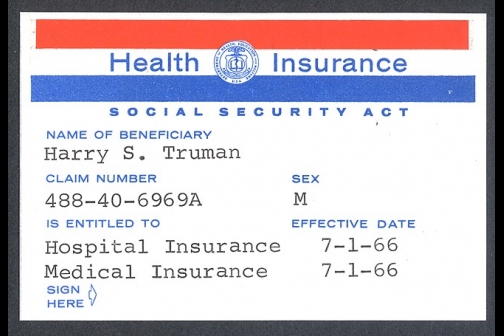
We told you earlier that Social Security was the brainchild of President Franklin D. Roosevelt. Its companion in easing the financial hardships of the elderly, Medicare, was the brainchild of another president, Lyndon B. Johnson. Not surprisingly, it was modeled closely on FDR’s “simple and elegant”—and extremely popular—program.
Medicare is a national health insurance system, funded by fees paid by recipients (based on income) and taxes withheld from workers’ salaries with a matching amount paid by employers. (Workers and companies each pay 1.45 percent of the employee’s wages for a combined 2.9 percent contribution.) It is not that different from national health systems in Canada or South Korea, with one exception: It is only for those age 65 or older.
Medicare is hugely popular among seniors, but it is also popular among those who pay for it, the working population. Polls indicate it is the second most popular federal government program, behind only Social Security. There’s just one problem: Some of its recipients don’t know that it actually is a government program. During the Tea Party protests of 2009, one man angrily demanded that his congressman “keep your government hands off my Medicare.” “I had to politely explain,” the Republican congressman said, “that, actually, sir, your health care is being provided by the government. But he wasn’t having any of it.”
So how did we get this popular, efficient, effective, and sometimes misunderstood government program? Thanks to a large Democratic majority in Congress, a series of political compromises (there’s a reason Medicare is divided into “Part A” and “Part B” coverage), and President Johnson’s political skill and determination. This will puzzle many today. Given Medicare’s popularity, who could have been against it in the 1960s? Most of the medical establishment and a large segment of the Republican Party. And not just against it, but bitterly opposed. For a taste of how extreme was the opposition, listen to a future president, Ronald Reagan, predict in 1961, when an earlier version of Medicare was introduced, that it would lead to . . . the end of freedom in America.
Needless to say, Medicare neither bankrupted America’s health care system nor ended freedom. On the contrary, by most measurements, Medicare and its companion program, Medicaid, which provides health care for the poor, made health care better, not only for the elderly and the indigent but for all of us.
And while there was fierce opposition at its birth, Medicare has become popular with both parties. Both Democratic and Republican presidents have expanded its coverage. In fact, the largest expansion of benefits took place in 2003, when Congress added a prescription-drug benefit supported by President George W. Bush.
So if you are over age 65 and covered by Medicare—or look forward to this coverage one day for yourself or your parents—you can thank government for it.
More information:
https://interactives.commonwealthfund.org/medicare-timeline/
Give the credit to: federal government
Photo by LBJ Presidential Library
Leave a Reply